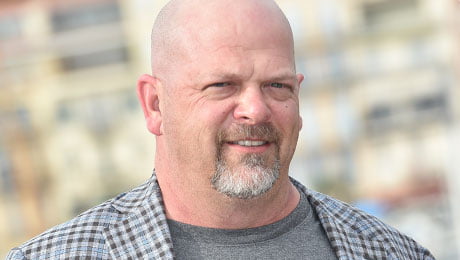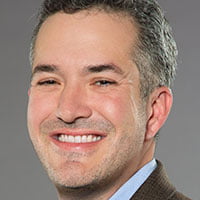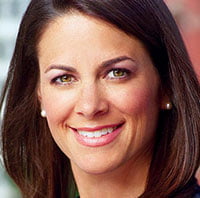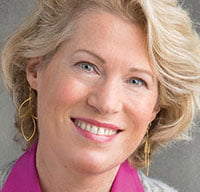Direction of travel
Posted By Clive Whittingham On 21-10-2016 @ 3:47 pm In Features | Comments Disabled
After several years of chasing each other’s commissioning strategies, the big factual cablenets are taking very different programming directions. Clive Whittingham reports.

Pawn Stars’ Rick Harrison at Mipcom
In a way it was odd to see Pawn Stars’ Rick Harrison around and about Cannes at Mipcom this week. It was, until recently, something of a standing joke that every factual cablenet in the US had to have a series in a pawn shop, another opening lock-up garages, one in a swamp, one involving some sort of perilous fishing and so on.
Some, like Pawn Stars, Gold Rush and Deadliest Catch, continue to survive and thrive, but even they have had to evolve as America has fallen out of love with the overly constructed reality series that came to dominate in the early part of this decade.
What’s interesting is that, having all chased that same high-volume, low-cost reality gravy train together, the networks are now moving in distinct directions much more closely affiliated with their channel brands as they attempt to cut through amid cord-cutting, ‘too much TV’ and competition from streamers.
As A+E Networks settled into its new Palais headquarters – a stand formerly held by Discovery, of which a little more later – the stand-fitters and electricians were moved to one side for an hour on Sunday night for a champagne showcase of its big new shows. Knightfall, Six, UnReal – dramas, mostly.

Arturo Interian
Arturo Interian is VP of scripted programming at A+E’s History and he’s eyeing more contemporary pieces moving forwards. “Our goal is to get four or five dramas on air each year by 2018/19 and we’re well on our way,” he says.
“We’re often known for the distant past, and Knightfall and Vikings play into that, but what’s going to happen with us, and the genre as a whole, is you’re going to see us take on the more recent past. I say to producers, ‘Don’t limit yourself to 500 years ago, think about five minutes ago as well.’”
National Geographic can be found in the Fox Networks Group tent these days, following the deal [1] with 21st Century Fox just over a year ago. In the US, the channel has moved to a “fewer, bigger, better” strategy where significantly increased programme budgets are being used for projects like Mars and the forthcoming Genius anthology series, and attracting programme-making talent like Ron Howard and Brain Grazer.
Speaking at the Fox cocktails event on Monday, National Geographic Channel CEO Courteney Monroe told C21: “This month marks the turning point in the transformation of our network. We started working on a radical new strategy a year and a few months ago and it starts to manifest itself this quarter with Mars and other projects. Our aim is to be the world’s leading destination for premium science, adventure and exploration programming, and we’re on our way now.”

Nat Geo’s ‘fewer, bigger, better’ strategy includes the likes of Mars
For Monroe, the strategy the channel previously pursued won’t work in an age of premium, often film-scale drama projects and streamers pouring millions into original content.
“We tried to do a bit of everything previously. It was a tonnage play – lots of hours at lower cost,” she says. “There is so much amazing content out there now, there is no way to break through without being exceptional. That model of a tonne of mediocre stuff… I don’t see how you win, and I don’t think that’s what people expect from Nat Geo. It’s about creating content people feel is worth paying for. However we’ll be distributed in the future, it has to be worth paying for.”
Nat Geo isn’t just sticking all the chips on scripted projects, though. The strategy includes a renewed focus on feature docs, with projects with Alex Gibney, Brett Morgan and Sebastien Junger in the works and the acquisition of Fisher Stevens’ climate change doc Before the Flood, which will air before the end of the month.
With Netflix, Amazon and Apple – plus dedicated factual SVoD services like John Hendricks’ Curiosity Stream in the US and the recently announced Yaddo venture from departing [2] BBC Storyville editor Nick Fraser – all now providing documentaries for purchase and/or streaming online to decent success, it’s hard to remember a time in the recent past when the beleaguered makers of feature docs had so many big-name places to sell to.

Courteney Monroe
Sundog Pictures was in town this week shopping a feature doc on the life of Richard Branson, told through his balloon adventures by filmmaker Dan Gordon, where TV is already a third window after a ‘whole universe’ deal with Netflix as well as theatrical and iTunes releases.
But it’s not like the bulk-ordered 30-minute factual/reality content has gone away, it’s just that buyers are looking for more authenticity.
Kathleen Finch, chief programming, content and brand officer at Scripps, has been meeting producers in Cannes this week with a clear aim of bolstering the performance of Travel Channel and refreshing Food Network through the discovery of new on-screen talent.
Finch told C21 the goal was to elevate Travel to the same ratings level as Scripps’ HGTV and Food Network. “We are aggressively looking for content for Travel,” she said. “We want fun, dynamic hosts who don’t necessarily have to be travel experts but have to be passionate about learning about a place.”
It’s a similar story at Food Network. “We have stars on Food Network but we want a lot more,” Finch adds. “International works well on Food – chefs, home cooks, food writers, anybody dynamic in the food space.”
And Finch is keen to be pitched talent early, rather than ideas with talent attached. Scripps’ own development team has ideas in the pipeline waiting for talent to be attached, so she’s keen for prodcos to bring her commissioners people rather than fully formed ideas.

Kathleen Finch
“If you’ve got a great talent, don’t spend three months trying to figure out the perfect format for them. Bring us the talent and within three months we could have a pilot shot with you and ready to air,” she says. “Many of our biggest on-screen stars started out with a Skype interview.”
Rich Ross sparked that authenticity drive when he took over Discovery Channel in the US last year. On the international front, Discovery is preparing to go through another change in the senior programming structure.
Discovery Networks International (DNI) chief creative officer Phil Craig left [3] during Mipcom last year having himself only replaced Julian Bellamy eight months previous. The responsibilities segued to Marjorie Kaplan, who had moved [4] to a London-based president of content role in August but is now also leaving, with her role being cut and her team moved into DNI’s UK division, reporting to Susanna Dinnage.
With the Northern Europe arm of the exec structure also being cut, following the departure of fellow long-termer Dee Forbes to RTÉ, it’s clearly a time of some transition at Discovery, which wasn’t exhibiting in Cannes this week. Perhaps its next direction will be the most interesting one on which to keep an eye.
Article printed from C21Media: https://www.c21media.net
URL to article: https://www.c21media.net/direction-of-travel/
URLs in this post:
[1] deal: https://www.c21media.net/fox-nat-geo-in-new-jv/
[2] departing: https://www.c21media.net/storyvilles-fraser-to-leave-bbc
[3] left: https://www.c21media.net/phil-craig-exits-discovery/
[4] moved: https://www.c21media.net/discovery-taps-kaplan-for-global-content/
[5] Image: https://www.zodiakrights.com/content/show/1074720
Click here to print.
